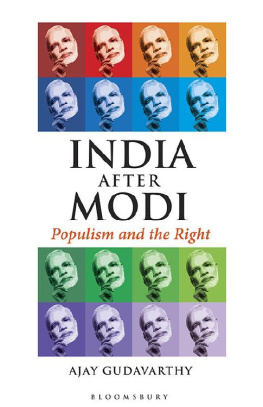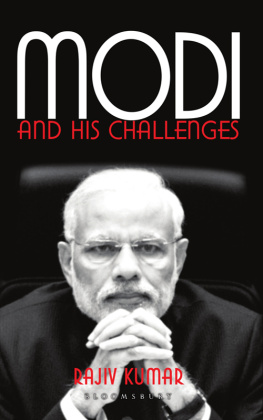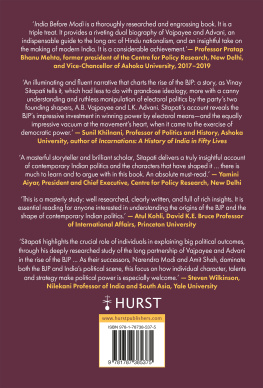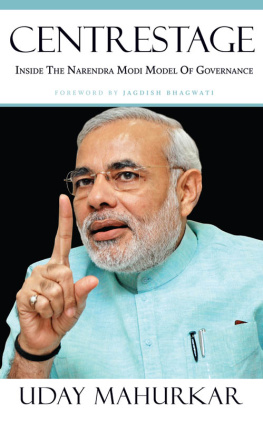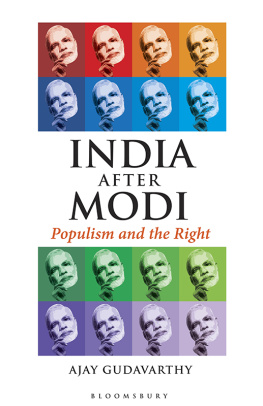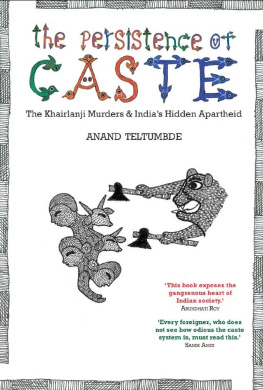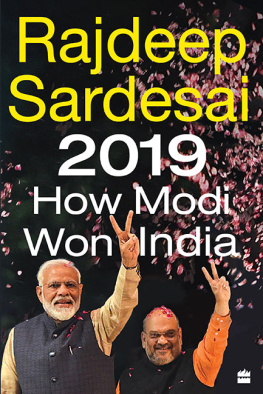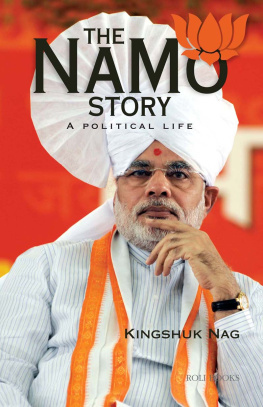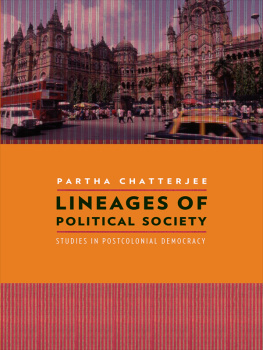INDIA AFTER MODI
INDIA
AFTER
MODI
Populism and the Right
Ajay Gudavarthy

BLOOMSBURY INDIA
Bloomsbury Publishing India Pvt. Ltd
Second Floor, LSC Building No. 4, DDA Complex, Pocket C 6 & 7,
Vasant Kunj New Delhi 110070
BLOOMSBURY, BLOOMSBURY INDIA and the Diana logo are trademarks of
Bloomsbury Publishing Plc
First published in India 2019
This edition published 2019
Copyright Ajay Gudavarthy, 2019
Ajay Gudavarthy has asserted his right under the Indian Copyright Act to be identified as Author of this work
All rights reserved. No part of this publication may be reproduced or transmitted in any form or by any means, electronic or mechanical, including photocopying, recording, or any information storage or retrieval system, without prior permission in writing from the publishers
Bloomsbury Publishing Plc does not have any control over, or responsibility for, any third-party websites referred to or in this book. All internet addresses given in this book were correct at the time of going to press. The author and publisher regret any inconvenience caused if addresses have changed or sites have ceased to exist, but can accept no responsibility for any such changes
ISBN: HB: 978-9-3880-3881-2; eBook: 978-9-3880-3883-6
2 4 6 8 10 9 7 5 3 1
Created by Manipal Digital
Printed and bound in India by Thomson Press Pvt Ltd
Bloomsbury Publishing Plc makes every effort to ensure that the papers used in the manufacture of our books are natural, recyclable products made from wood grown in well-managed forests. Our manufacturing processes conform to the environmental regulations of the country of origin.
To find out more about our authors and books visit www.bloomsbury.com and sign up for our newsletters
To my relationsVenu Kaka, Bhakti Kaka, Ravi Kaka, Naranna, Seenanna, and Anuragfor making my trips to Hyderabad warm and eventful.
Interactions with them also helped me understand Right-wing populism better!
CONTENTS
T his book is a reflection on the current political dispensation working under the leadership of Prime Minister Modi. It attempts to take a critical look at all the major events that transpired since 2014 and as a run-up to 2019. It is premised on the argument that India after Modi is distinct from what it was before. I have attempted to tread a difficult line of making the book readable to the common reader and anyone interested in what is going on with democracy in India; further, this will appeal to social scientists, scholars, journalists, policymakers, and others with a degree of specialization relevant to reading politics.
Some of the articles published as short essays in various news dailies and web portals have been rewritten to further explore the interconnections between them and produce (hopefully) tightly held arguments, mapping the changes and pre-empting the ones to come. The essays have been published earlier in The Hindu, The Indian Express, New Indian Express, The Wire, News Laundry, Deccan Herald, South Live, Himal South Asian, Book Review and the Economic and Political Weekly (EPW). I gratefully acknowledge all of them.
I acknowledge with thanks all colleagues and friends who were part of this bumpy ride, including Janjira Sambatpoonaseri, Marc Saxer, Anil Menon, B.S. Chimni, Zoya Hasan, Arfa Khannum, Amir Ali, Neera Chandhoke, Satish Jha, Burra Srinivas, Afroz Alam, Maninder Thakur, Divyaraj Amiya, Trevor Stack, Anand Teltumbde, Anindya Purukayastha, Saswat Das, Nicholas Tampio, Heike, Samir Gandesha, Anup Dhar, Swagato Sarkar, A.P.S. Chauhan, Ashok Kaul, Taru Shikha, Bal Reddy, Govindraj Hegde, T.G. Suresh, Shiju Verghese, Supriya Roychoudhary, Manisha Sethi, G. Vijay, V.S. Prasad, Dr Narshima Reddy, and many others I inadvertently forget to mention here. I thank many students at the Centre for Political Studies for engaging discussions and filling in the days with mirth, helping me avoid the distaste of institutional realities! I immensely benefitted out of continuous dialogue and discussions with all of them. I thank Gurpreet Mahajan for the discussions and Satyender for the help in processing the funding of the field trips through the Departmental Special Assistance (DSA).
I am thankful to all those who have extended invitations to be part of academic meets that they organized including Mahesh Rangarajan, Mohan Gopal, Ravi Kumar, Afroz Alam, Bijaylakshmi, Venkatesu, Rashmi Doraisamy, Dhananjay Tripathi, J. Prabash, Vivek Kumar, Gurram Srinivas, Smriti Das, Maninder Thakur, Pia David, Ajay Behera, Biju, G.N. Trivedi, Subodh Kumar Sajjan, Anindya Purakayastha and Saswat Das, Dr Kuruvila, Mangesh Kulkarni, Srirupa Roy, Rama Rao, Muslim Education Society, Jaganatham, Deepak Kumar, Radhakrishnan, and Sudhir Suthur. Presenting papers and delivering public talks at the various events that they organized greatly contributed to the clarity with which I have been able to present the arguments in this book.
Finally, I wish to express my heartfelt thanks to Chandra Sekhar at Bloomsbury for suggesting the idea for the book and for suggesting that I rewrite it to read like a book. Without his persuasion, this book wouldnt be what it is.
Introduction:
Populism and the Afterlife of Democracy
D emocracies across the globe have taken a populist turn, with the rise of Trump in the US, at the onset of Brexit in UK, and with Narendra Modi in India. Most populist regimes, perhaps with the exception of Podemos in Spain, have all been Right wing, notwithstanding the local-national specificities. In other words, populism across the globe has certain common features, including the ability to create a people, projecting a strongman, polarizing between us and them, moralization of power and exclusion, mobilizing emotions and passions, bringing the private to the public, and replacing the institutional mode of pursuing politics and governance with street mobilizations, among others. However, the real script of the rise of populism is in the details. The commonality that has emerged as a new global process perhaps is linked to neo-liberalism (essentially linked to the idea of the withdrawal of social welfare policies) and the social and economic inequalities associated therewith, and decline of the appeal of the old Left and its progressive-secular values. Although economic inequalities and the role of global capitalist structures have not been displaced, the experience of such structures has become more complicated because of the dispersed nature of capitalism after globalization.
The materiality of the structures has become dispersed through global networks that are post-Westphalian, invisible, staggered, and therefore, difficult to locate as sites or targets of resistance. Progressive Left militant politics of various hues were based on the reading of politics as outcomes of clear effects of structural dislocation, palpable inequalities, declining quality and standard of living, and visible national or local targets for mobilization, which would produce new kinds of commonality in resistance either as a class or as multitudes.
The aforementioned broad structural change has been accompanied by the production of a unique historical moment, produced and contained on the back of the history of resistance movements of the last century, including the Russian Revolution. This unique historical moment has been one where the formal reach of the political discourse of equality, dignity, recognition, and representation has spread to all quarters and sections of human society, while the conditions to realize them have become cumulatively contained and dissipated. It is a moment that is keenly self-aware but en-caged and delimited. It is a moment that is marked by vast aspirations and robust imagination but is also less optimistic and hopeful. It is a moment that has a deep sense of what it is to be wronged but without a collective narrative of what the alternative looks like or how one gets there. Neither the route nor the destination are certain but the suffocation with the current location and life is too tangible to be missed. It is a situation that mobilizes resistance or perhaps negotiation, which could be a better way of putting it without a deep sense of hope or conviction for dramatic social change, but it is also a situation that is not content with small and everyday changes. It is a unique historical moment that is marked by what I would refer to as Conformist Optimism.
Next page
